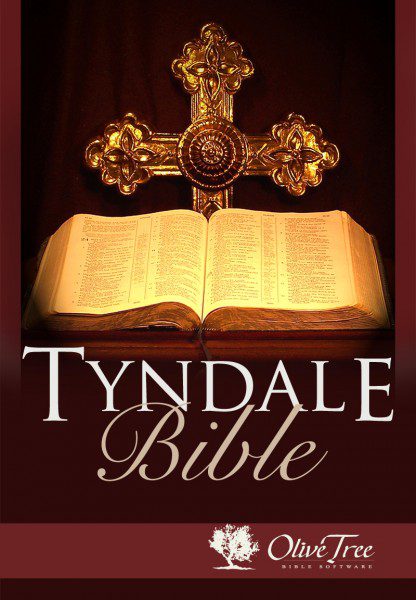The Tyndale Bible
500th Anniversary
1525 – 2025
If you lived in 16th-century England, you might think that God’s favorite language was Latin. The only authorized Bible was the Latin Vulgate. During that time, the Latin translation of the Bible was over 1,000 years old and fading like an old painting. Church father Jerome (who died in 420) was its main translator. For common people, the Psalms were simply sacred songs from a distant land in Israel. The Ten Commandments sounded like distant thunder from Mount Sinai. They knew the story of Christmas and the incarnation, but not its full meaning.
Sadly, ordinary folks could no longer hear the Bible preached or read in their own vernacular English. Over the years, translations of Tyndale’s Bible were smuggled into England. Those found were burned, and those caught owning one were also burned, all under the watch of the Church of Rome. But the tide could not be stopped, whether legal or not; it was preached from many pulpits. Tyndale’s translation would reform not only England but also the English language. Tyndale’s translation from Latin to English had a greater influence on the English language than Shakespeare, who often quoted the Bible.
Looking back 500 years, it is shocking to learn that the Roman Catholic Church was the most notorious opponent of the new translation of the Bible from Latin to English. Their top authorities were the ones who banned it and burned those who dared to read it. What were their reasons for doing so? One reason they taught was that the original intent cannot be fully conveyed in a new translation. But that is exactly the challenge of any translation. It is like saying the original intent of the American Constitution cannot be conveyed in German, French, or Swahili.
Another reason was the hierarchical attitude of the Roman Catholic Church, which led them to believe that we only have the intellectual ability to translate it into English. Thus, the ultimatum, ‘We therefore decree and ordain, that no man, hereafter, by his own authority translate any text of the Scripture into English or any other tongue . . . and that no man can read any such book . . . in part or in whole.”
The priests and magistrates of Tyndale’s day enforced such laws fiercely, sometimes burning Christians alive just for possessing the Lord’s Prayer in English. An English Bible, to them, posed more danger than a corrupt church or a common Christian owning one. But by the time Luther’s day rolled around in the 16th century, it was too late; the truth was out and could no longer be kept in a gilded cage.
To make matters worse was the egotistical attitude toward translating the Bible into English. Who do these English think they are? How can the oracles of God be beautifully translated into such a crude language? These English live on an isolated, semi-barbaric little island outside the mainstream of intellectual Europe. English is not spoken at the roundtables of kings, bishops, magistrates, and professors. This awkward language is enough for the common man, but Latin still dominates the language of theological discussions. Such was the thinking of the religious Hierarchy!
William Tyndale grew up, like every other boy his age, hearing the word of God in Latin. The Lord’s Prayer did not start with, “Our Father, which art in heaven,” but with “Pater noster, qui es in caelis.” All this began to make Tyndale’s teeth grind. He grew tired of a Latin-only religion and started reading the Bible in English. He probably noticed that, among all the other nations in Europe in the 1520s, each had its own vernacular Bible translation. Undoubtedly, he heard about Martin Luther’s groundbreaking German Bible, published in 1522. As a visionary and an exceptional linguist, himself, he saw more truth in the English Bible than in the church doctrines of his day.
Tyndale made a significant personal decision in his twenties when he heard someone say, “We were better … without God’s law than the pope’s,” and he responded, “I defy the Pope and all his laws. If God spares my life before many years, I will cause a boy who drives the plow to know more of the scripture than he does.”
We have little to sing about if we do not know the gospel. The true gospel makes a person’s heart glad and want to sing, dance, and leap for joy.
And so, Tyndale began to translate. He first went to London to seek support for his work nearby. When he found none, he left London for the continent and started working on a translation that would give the plowboy not only the Bible but the Bible in an English so beautiful it would last for centuries.
Tyndale introduced many new words to the English language, such as intercession, atonement, Passover, mercy seat, and scapegoat. His translation also included words that were familiar and heartfelt: words that even a plowboy could feel and understand.
In 1611, 86 years after Tyndale’s partial New Testament was smuggled into England, a new English Bible was published—one that would so win the hearts of English-speaking Christians that, for three centuries, it could almost be called the English Bible. Remarkably, most of the King James Version is based on Tyndale’s work: 84 percent of the New Testament and 76 percent of the Old Testament books he completed before his death in 1536. The translators of 1611 were so indebted to his pioneering efforts that C.S. Lewis could say of the KJV, “Our Bible is substantially Tyndale.”
Though great Tyndale was eventually hunted down and martyred for his work. His death was not in vain, as his work lives on in countless hearts.
No man can chain the wind, the truth, the gospel.
Submitted by Dr Robert Bryant

